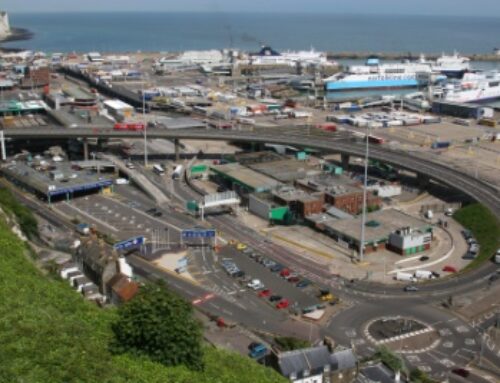Traffic commissioners’ report puts compliance in the spotlight
Shortages o f good drivers, good managers and competent systems to maintain compliance are recurring themes in the annual report of Great Britain’s traffic commissioners (TCs) for 2016-17, which was published by the Department of Transport late last year.
f good drivers, good managers and competent systems to maintain compliance are recurring themes in the annual report of Great Britain’s traffic commissioners (TCs) for 2016-17, which was published by the Department of Transport late last year.
Reporting on her final year in post, retiring senior traffic commissioner (STC) Beverley Bell (right) repeated a theme from last year: that reform was needed of operator licensing process if it were to reflect the realities of modern-day operations and service to compliant operators improve.
TC Bell pointed out that the actual cost of a freight licence was less than £100 a year, and the entire licensing system (and not just enforcement efforts) had to be financed from this.
She described some current transport law as being archaic, outdated and no longer fit for purpose and questioned whether the momentum for reform had been lost, pointing out that unscrupulous operators are getting away with compromising safety and fair competition and that there are insufficient resources for them to be targeted as quickly or efficiently as they should be.
TC Bell highlighted various reasons why there is a reported shortage of drivers (but did not include the very poor rewards for a trade where legal and reputational risk is so high) and said it was vital that industry and government took action accordingly.
Drivers’ use of mobile phones was picked out as a specific issue by TC Bell. She said the TCs welcomed the increase in penalties brought in last March, and that in addition, professional drivers  caught abusing mobile phones in commercial vehicles could expect a minimum sanction of a four-week suspension of their vocational licence.
caught abusing mobile phones in commercial vehicles could expect a minimum sanction of a four-week suspension of their vocational licence.
East of England
East of England TC Richard Turfitt (who has since also become the senior traffic commissioner following Beverley Bell’s retirement) said he was encouraged by the success of the new digital vehicle operator licence scheme. But he was concerned that only 16 per cent of licences were unaltered on renewal, suggesting that this meant that many operators were not notifying relevant changes when they occurred.
Like other commissioners, TC Turfitt was increasing the use of preliminary hearings and formal interviews as an alternative to full-blown public inquiries to help operators return to compliance. However, he reported that too many operators were leaving matters of compliance to drivers and fitters and ignoring advice being given by DVSA examiners.
TC Turfitt added that good drivers were as valuable as properly maintained vehicles. Management by memo was not proper management. Equally, paying for maintenance inspections and not examining or acting upon the results was a waste of money as well as a threat to road safety.
He pointed out that even after an adverse event, an operator might be able to avoid a public inquiry by obtaining expert advice rather than relying on ill-informed gossip.
Company directors needed to take responsibility for compliance, TC Turfitt said.
North East
Outgoing North Eastern TC Kevin Rooney reported on his final year in the region before moving to take over in the Western area. He has since been succeeded by Tim Blackmore in the North East.
TC Rooney identified falsification as a recurring theme of the year, with examples including the supply of Driver CPC cards without training by a large organisation to drivers working for a supplier company, and numerous instances of tachograph fraud.
Some employers were encouraging ‘driving off the card’, while others were unaware of their drivers’ behaviour because they were not analysing data from the tachograph itself – just downloading the drivers’ cards.
TC Rooney said that in the latter case, the operator’s reaction when the offences came to light was key. If the operator took no action then their licence would be likely to be revoked. On the other hand, a prompt reaction, with training, new systems and process improvement could save the licence.
He pointed out that operators who regularly went to the 90-day maximum for tachograph downloading were most at risk: it was hard to recall exactly what a driver might have been doing on a specific day three months previously.
Where vehicles were away all week, the temptation for drivers to work off the card was greater than for drivers of vehicles on day work, and it was essential that in such cases data was downloaded weekly from drivers’ cards and four-weekly from vehicle units.
This downloading should be followed by rapid and thorough analysis, driver debriefing, retraining and, ultimately, effective discipline.
DVSA continued to seek out illegal cabotage by detaining offending vehicles. Finance companies which owned detained offending vehicles could apply to the TC for their return if they were unaware of their illegal use.
But, TC Rooney reported, “where the owner is a revoked UK operator running right-hand drive trucks on a Bulgarian operator’s licence, their task is somewhat more difficult. I mention this just so that GB hauliers are aware that DVSA’s enforcement activity and commissioners’ scrutiny of impounding appeals are driven by the principle of fair competition.”
North West
In her role as TC for the North West, Beverley Bell delegated reporting to Deputy TC Simon Evans, who actually handled the majority of inquiries in the area and has, since the report was written, become the North Western TC himself following Mrs Bell’s retirement.
DTC Evans identified four main themes that emerged from hearings:
- Named transport managers being unable to produce any evidence of their activity in the business. “How can it possibly be that such a post holder can be exercising continuous and effective management of the transport operations in a business, yet there is no letter, internal report, memorandum to a director nor instructions to a driver demonstrating the fact?” he asked.
- A “surprising and concerning” failure to have proper procedures and systems for downloading digital tachograph data, and identifying missing mileage. Too many operators who had purchased sophisticated tachograph analysis systems appeared to have little idea as to how to use them.
- Failure by operators to notify material changes that affect their licence – for example, a change in directorships. DTC Evans pointed out that links between the licensing system and Companies House meant that operators should ensure that all such changes should be notified promptly if action were to be avoided.
- A continuing reliance on old-style paper driving licences to prove driving entitlement and endorsement history.
South East and London
Brake testing was a major theme of the report from TC Sarah Bell, who is now TC for London and the South East, but previously held the position in the Western area.
Harking back to the aftermath of the Bath tipper crash, TC Bell claimed that her holding of a public inquiry into the operator’s conduct subsequent to the crash but before the commencement of the criminal trial indicated that the regulatory system was a success.
The incident occurred in February 2015, and the operator was taken off the road by TC Bell the following October.
She highlighted the importance of thorough brake testing in the light of the accident, pointing out that many operators were no better at brake testing than the one involved in the Bath incident: with a roller test only as part of the annual MoT, and a reliance on road testing as the only other means of judging brake e fficiency in between.
fficiency in between.
TC Bell emphasised that the DVSA Guide to Maintaining Roadworthiness was clear that a minimum of four roller brake tests should be undertaken on each vehicle every year, but there should also be a roller brake test or decelorometer test at every inspection and that ‘road’ brake tests should be the exception rather than the rule.
She called on operators and those working with them to have a “root and branch” review of their approach to risk-management and accountability. The time to do this was, she said, during a period of calm, not after a crisis had arisen.
Problems were not confined to operators on restricted licences, and transport managers who did not take their responsibilities seriously could find themselves out of a job, or worse.
She urged operators to use the online Vehicle Operator Licensing (VOL) system as much as possible, to help “speed up the time in which decisions can be taken across the board”.
West Midlands
Brake testing was also highlighted by Nick Denton, who has been appointed as West Midlands TC, having moved from London and the South East. Operators were failing to ensure that their vehicle maintainers were carrying out proper tests rather than just “stamping on the brake pedal to see if the vehicle stops.”
He also echoed the comments of others in highlighting operators lacking equipment to download tachograph and drivers’ card data, not having the software to analyse it, and not acting on deficiencies that it revealed.
Unless operators checked data from cards against data from tachographs they could not discern if someone had simply removed their card and carried on driving.
Drivers ‘ticking boxes’ instead of carrying out proper daily inspections, operators failing to have formal safety inspections carried out at the promised intervals, and failing to see that regular roadside prohibitions and MoT test failures indicated that something was seriously wrong with the way in which vehicles were maintained, were also issues highlighted.
TC Denton highlighted basic failings still being made by operators, including letting vehicles go untaxed, uninsured and untested, and failing to regularly check drivers’ licence entitlement and DCPC status. He warned that agencies did not always send suitably qua lified drivers when asked.
lified drivers when asked.
A specific abuse which had emerged in the West Midlands was drivers in the aggregates industry using a second driver tachograph card to, literally, moonlight: working days for one operator on one card and nights on another card which had ostensibly been obtained as a replacement. Some drivers were working for as much as 20 hours a day.
It was obviously difficult for employers to detect this, but TC Denton said operators could check the number of the driver’s card most recently issued to the individual concerned via the DVLA’s online service, and should ensure that this was the one that was actually being used.
With construction work in Birmingham set to boom with work on HS2, TC Denton asked for a joint task force similar to the one in operation in London to be set up to monitor vehicles used by the construction industry.
He saw the removal of seriously non-compliant operators as being a priority – pointing out that in one case it had taken under 12 weeks from a complaint being made to a licence being revoked.
He closed by highlighting a loophole in the law which allowed a company that had had its licence revoked after a serious accident to try to continue operations using crane-equipped vehicles that were exempt from O-licensing.
He said that in one case he had written to the clients of such a company explaining the reputational risk they might incur should they continue to use it. TC Denton said that he looked forward to a speedy end to the exemption that allowed this to go on.
West of England
Kevin Rooney has replaced Sarah Bell as TC for the West of England. He highlighted the problem of UK operators which have had their licences revoked for flouting cabotage rules in Bulgarian-registered trucks.
He reported two unusual cases: one where a coach operator had tried unsuccessfully to establish financial standing by using the ‘available credit’ on a selection of supermarket credit cards, and another where all the drivers working for a truck operator had set up their own limited companies, and were claiming to be employment agencies to reduce exposure to taxation.
“The practice of drivers claiming self-employment is not unusual but it is rarely likely to be legal, and is unfair on those drivers and operators who pay the taxes due. For those reasons, where it cannot be shown that self-employed drivers is legal, operators and transport managers put their good repute at risk,” he warned.
TC Rooney concluded by mentioning the Bath tipper case which had happened in his patch, although not on his watch.
The case: “sends a wake-up call to every single operator, transport manager, fitter and driver in the industry,” he said.
“I am pleased to say that it has also caused the industry, including the regulators and enforcers, to take a long hard look at what can be learned. I look forward to working with the industry and DVSA in developing and implementing meaningful changes to reduce as far as possible a repeat of the circumstances that led to those tragic deaths.”
Scotland
Joan Aitken, TC for Scotland, pointed out that successful regulation was invisible: it kept people safe without them knowing it was there. But the risk was that when bad things did not happen, there was pressure to “lift the burden on business” which created new risk through lack of regulation.
TC Aitken welcomed the new digital licensing system, but warned that regulators still needed time if they were to be effective gatekeepers in keeping undesirables out of the industry.
The importance of finding out who was who had been underlined by a case she had heard earlier in the year when a disqualified operator had taken advantage of the financial distress of another, taken over their licence, and then used friends and family to front for him. His cover had been blown by people within the haulage industry.
TC Aitken said she and her colleagues were often asked why they didn’t “do something” about particular operators, but gossip was not enough. The co-operation of others in the industry, and from the public and other agencies, was required.
On driver conduct, TC Aitken said she was pleased to have been supported by the sheriff when a decision she had made to ban a 55-year-old driver for 20 years was taken to appeal.
She said the question that she asked herself in such cases was “Do I have to wait until someone is killed or seriously injured before I can take action?” and that sentiment had been echoed by the presiding sheriff at the appeal.
She reminded drivers that Scotland now had some different traffic laws to England. In particular, the HGV speed limit remains at 40 on single carriageways, other than on the A9, and the drink-drive limit is lower.
Wales
Nick Jones celebrated his appointment as the first TC dedicated to Wales (he had previously covered the country as an adjunct to his role as West Midlands TC). This had been made possible by part-funding from the Welsh Assembly Government, and a wider role was planned for the TC in Wales, together with a Welsh office with bilingual staff.
He was also pleased to see that the DVSA was to increase staffing levels in Wales which would, in time, lead to improved safety standards for road users. There was little other detail in his report, but he said a more substantial one was being prepared for submission to the Welsh Government.
Enforcement images: DVSA Crown copyright











